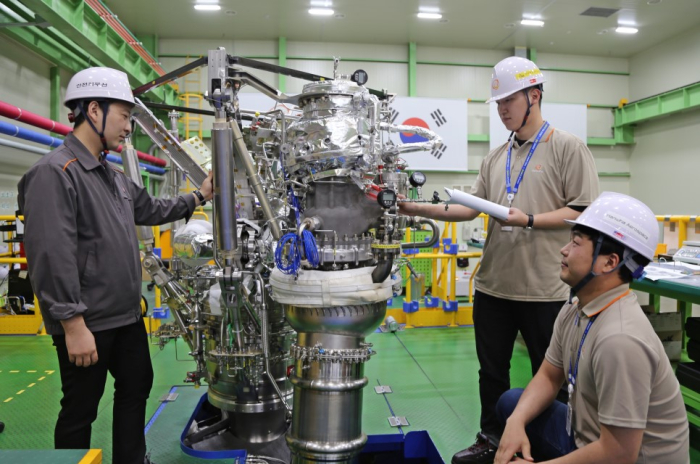Aerospace
Hanwha to make satellite thrusters with Korea's aerospace institute
Hanwha’s storable bipropellant thruster is one of 10 key space components that Korea aims to localize within the year
By Jun 28, 2021 (Gmt+09:00)
1
Min read
Most Read
LG Chem to sell water filter business to Glenwood PE for $692 million


Kyobo Life poised to buy Japan’s SBI Group-owned savings bank


KT&G eyes overseas M&A after rejecting activist fund's offer


StockX in merger talks with Naver’s online reseller Kream


Mirae Asset to be named Korea Post’s core real estate fund operator



Hanwha Corp. will develop the bipropellant thruster, a key component for adjusting the satellite’s position in orbit, together with Korea Aerospace Research Institute (KARI), according to the company’s release.
Hanwha will invest a total of 80 billion won ($71 million) by 2025 to develop the component that until now was imported from Germany and other countries.
KARI said its partnership with Hanwha marks one of 10 Space Pioneer projects that the institute will kick off this year. Space Pioneer is a government-led initiative to localize key components previously imported by the country’s space industry.
Analysts say that the thruster is often referred to as “the heart” of a satellite as it has a direct impact on its lifespan. The thruster helps satellites adjust their orbit and positions in case of interference by the gravities of Earth and other planets.
Hanwha and KARI said that their new thruster will adopt a storable bipropellant mechanism to allow satellites to survive for a longer period.
After separating from the main rocket, the satellites need to reach the target orbit using the thrusters and must withstand extreme environments for up to 15 years in space.
Hanwha said that the storable bipropellant mechanism ensures better fuel efficiency by storing fuel and oxidants in different tanks, a practice that allows more fuel to be stored for a longer time span.
“At a time when the space sector is led by the private sector, this is a significant achievement -- having localized a core technology that had 100% overseas dependency,” said Hanwha CEO Kim Seung-mo.
Write to Kyung-min Kang at kkm1026@hankyung.com
Daniel Cho edited this article.
More to Read
-
 Aircraft engine partsHanwha Aerospace in $320 mn deal to supply aircraft engine parts to GE
Aircraft engine partsHanwha Aerospace in $320 mn deal to supply aircraft engine parts to GEMay 25, 2021 (Gmt+09:00)
1 Min read -

-
 Hanwha GroupHanwha launches group-wide task force to bolster space business
Hanwha GroupHanwha launches group-wide task force to bolster space businessMar 08, 2021 (Gmt+09:00)
2 Min read
Comment 0
LOG IN


